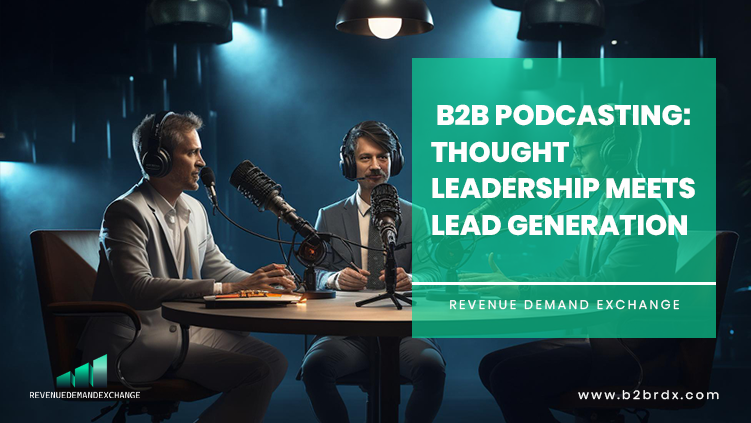B2B Podcasting: Thought Leadership Meets Lead Generation

In the crowded B2B marketing landscape, brands are constantly seeking fresh, authentic ways to connect with decision-makers. Traditional channels like email, blogs, and webinars still work, but they’re saturated. Enter podcasting—a medium that offers a powerful blend of thought leadership, storytelling, and trust-building. What started as an entertainment format has evolved into a serious marketing tool, capable of generating leads, nurturing relationships, and positioning brands as industry authorities. B2B podcasting is no longer optional; it’s a strategic asset that bridges credibility and conversion.
The Rise of B2B Podcasting
Podcasting has exploded in popularity among professionals seeking on-the-go learning. Executives and decision-makers tune in while commuting, exercising, or working, making it an ideal format for B2B engagement. According to industry reports, more than half of business leaders now listen to podcasts weekly, and many say it influences their purchasing decisions. For B2B brands, this means an opportunity to reach highly engaged audiences through authentic, long-form conversations that traditional ads can’t replicate. Podcasting isn’t just about broadcasting—it’s about connecting, educating, and inspiring.
Establishing Thought Leadership Through Voice
In B2B markets, authority is everything. Buyers don’t just purchase products—they invest in expertise. A podcast provides a platform for showcasing that expertise in a conversational, human way. By discussing trends, challenges, and innovations, brands can demonstrate deep industry knowledge and thought leadership. Hosting guests such as clients, industry experts, or even competitors adds credibility and diversity of perspective. Over time, consistent and insightful episodes position your company as a go-to source for industry insights, enhancing trust and influence among target audiences.
Humanizing the Brand
One of podcasting’s biggest advantages is its authenticity. Unlike polished marketing campaigns, podcasts allow for real conversations and personality to shine through. This human touch resonates with listeners who are tired of corporate jargon and sales-heavy messaging. A B2B podcast gives your brand a voice—literally—and helps audiences connect emotionally. It’s not just about showcasing what you sell but who you are. When prospects feel like they know your team, they’re more likely to trust your brand and engage when it’s time to make purchasing decisions.
Generating Leads Through Content Strategy
Podcasting can be a powerful lead-generation engine when integrated strategically. Each episode can guide listeners toward deeper engagement with your brand. For example, you can create companion gated assets like detailed reports, checklists, or exclusive webinars related to podcast topics. Promoting these resources within episodes and show notes encourages listeners to exchange their information for added value. Additionally, podcasts drive traffic to your website, nurture leads through email sequences, and keep your brand top-of-mind for future opportunities. The key lies in treating your podcast as a content hub rather than an isolated effort.
Leveraging Guests and Networks for Reach
Inviting industry experts, clients, and partners as guests on your podcast does more than enrich the conversation—it extends your reach. Each guest brings their own audience, social media following, and credibility to your show. This cross-promotion amplifies brand visibility and helps attract new listeners who fit your ideal customer profile. Over time, these collaborations can turn into partnerships, referral opportunities, or even new business deals. The relationships you build through podcasting can be as valuable as the leads themselves.
Building Trust Through Consistency
Trust isn’t built overnight—it’s earned through consistency and value delivery. A successful B2B podcast requires regular publishing and high-quality content that genuinely benefits listeners. Whether you post weekly, biweekly, or monthly, stick to your schedule. Listeners who know when to expect new episodes are more likely to subscribe and stay engaged. Consistency also signals reliability—a core trait that B2B buyers look for in vendors. When your brand continually shows up with insights, solutions, and expertise, it reinforces your credibility and strengthens audience loyalty.
Amplifying Podcast Content Across Channels
Podcast episodes shouldn’t live in isolation. Repurposing them across other channels multiplies their impact. Transcribe episodes into blog posts for SEO, turn quotes into social media snippets, or compile insights into newsletters. You can even create video clips for platforms like LinkedIn or YouTube to capture visual audiences. Repurposing not only increases reach but also ensures your podcast contributes to the broader content ecosystem. This integrated approach turns each episode into a multi-channel lead-generation asset that continues delivering value long after it’s published.
Measuring Podcast ROI in B2B Marketing
While podcasting’s impact isn’t always immediate, it’s measurable. Key performance indicators include downloads, listener growth, website traffic, lead magnet conversions, and engagement metrics such as average listen time. You can also track qualitative indicators like inbound inquiries mentioning your show or increased engagement from target accounts. Over time, podcasts often lead to better brand perception, stronger relationships, and higher lead-to-close rates. By aligning podcast topics with sales objectives and nurturing workflows, you can directly connect content performance to pipeline growth.
Overcoming Common B2B Podcasting Challenges
Launching a podcast may sound daunting—especially for B2B teams unfamiliar with audio production. Common challenges include maintaining content consistency, finding unique topics, and promoting effectively. The solution lies in clear planning: define your audience, set measurable goals, and outline content themes in advance. Invest in decent recording equipment and use professional editing tools to ensure quality. Most importantly, focus on storytelling and relevance rather than perfection. The more authentic and valuable your content, the faster you’ll build an audience that listens—and converts.
Conclusion
B2B podcasting represents the perfect intersection of thought leadership and lead generation. It’s where expertise meets authenticity, and storytelling meets strategy. Beyond attracting attention, a podcast builds meaningful relationships—turning listeners into loyal followers and prospects into clients. For brands willing to invest in consistent, high-value content, the returns go far beyond downloads. A well-executed B2B podcast can elevate brand authority, deepen trust, and fuel a sustainable pipeline of high-quality leads. In an age where connection is currency, podcasting isn’t just a trend—it’s a long-term growth engine for modern B2B marketing.








